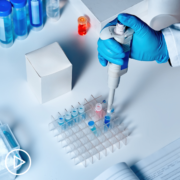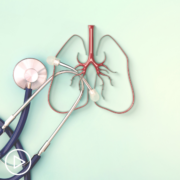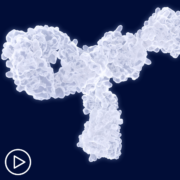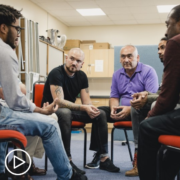Antibody Drug Conjugates for Lung Cancer | Advances in Research
Antibody Drug Conjugates for Lung Cancer | Advances in Research from Patient Empowerment Network on Vimeo.
What are antibody drug conjugates, and how are these new agents changing lung cancer care? Lung cancer expert Dr. Thomas Marron defines antibody drug conjugates and explains how they work to treat lung cancer.
Dr. Thomas Marron is Director of the Early Phase Trials Unit at the Tisch Cancer Institute at Mount Sinai Hospital. Dr. Marron is also Professor of Medicine and Professor of Immunology and Immunotherapy at the Icahn School of Medicine at Mount Sinai. Learn more about Dr. Marron.
See More from EVOLVE Lung Cancer
Related Resources

Advances in Targeted Lung Cancer Treatments | What You Should Know |

|

Expert Perspective | New and Emerging Progress in Lung Cancer Treatment |
Transcript:
Katherine Banwell:
What are antibody drug conjugates, and how do they treat lung cancer?
Dr. Thomas Marron:
So, antibodies are proteins that have been manufactured. They’re a synthetic version of something that happens in our own body And they’re very specific for a very unique protein. And so, there are certain cancer proteins, there’s proteins on the surface of cancer that really aren’t expressed anywhere else in your body. And so, what we can do is we can develop these antibodies that basically are a heat-seeking missile. So, you inject them like chemotherapy, through an IV. But they’re a heat-sinking missile, and they go throughout your body, and they stick themselves to the cancer.
And hopefully, they don’t stick anywhere else. And basically, antibody drug conjugate means the drug is conjugated to the antibody, meaning you basically have glued chemotherapy onto that antibody.
And so, what it allows us to do is, instead of giving chemotherapy through the IV like we normally would, where that chemotherapy goes everywhere in your body, and that’s the main reason that you have toxicity.
It doesn’t just go to the cancer, it also goes to your bone marrow, to your hair, to your intestines, has side effects. Antibody drug conjugates, the goal of them is to really deliver the chemotherapy directly to the tumor and spare the rest of your body, the toxicity from the chemotherapy that’s glued onto the antibody.
It’s important to note that they still do have side effects. So, some of that chemotherapy, for lack of a better term falls off the antibody or it might leak out of the tumor after it kills the tumor cells. And so, there is still the potential for toxicity, very similar to the toxicities that we see with chemotherapy.
But so far, the data is very encouraging, both in lung cancer and other cancer types that antibody drug conjugates might be a superior formulation of chemotherapy, so better able to treat lung cancer. And we have a few drugs that’re actually probably going to be FDA-approved in the second line setting for non-small cell lung cancer. So, that’s for patients who have received standard first-line therapy and unfortunately, their cancer has progressed.
And we actually already have one drug that was, it’s called Enhertu that was developed for breast cancer. And that’s now FDA-approved for lung cancer, for a rare subset of lung cancer patients who have an exon-20 HER2 mutation.
And the patients I’ve treated with that drug do extremely well, and so I think it’s a very encouraging sign of what’s to come using more and more of these targeted chemotherapy regimens.
Katherine Banwell:
Yeah. Well, that leads me to the next question, is there a patient type that ADCs are right for?
Dr. Thomas Marron:
So, maybe is the question, answer. So, I don’t know because we don’t have good biomarkers right now to identify the patients that’re going to respond best to the drugs that’re in development, at least those ones that’re furthest along in development.
And we’re always searching for biomarkers, which basically just means a test that we do on the patient’s biopsy or in their blood to tell us who’s going to respond to a therapy and who’s not. Unfortunately, right now we don’t have a good biomarker for these drugs.
Hopefully as we do larger trials and we study biopsies and blood from the patients on those trials, we can identify the subset of patients that will do best with the therapy. Because we always want to make sure we’re getting patients the best therapy for them and we’re avoiding giving these therapies, because there are some toxicities to patients that aren’t going to respond to the therapy. So, it’s definitely a work in progress.










